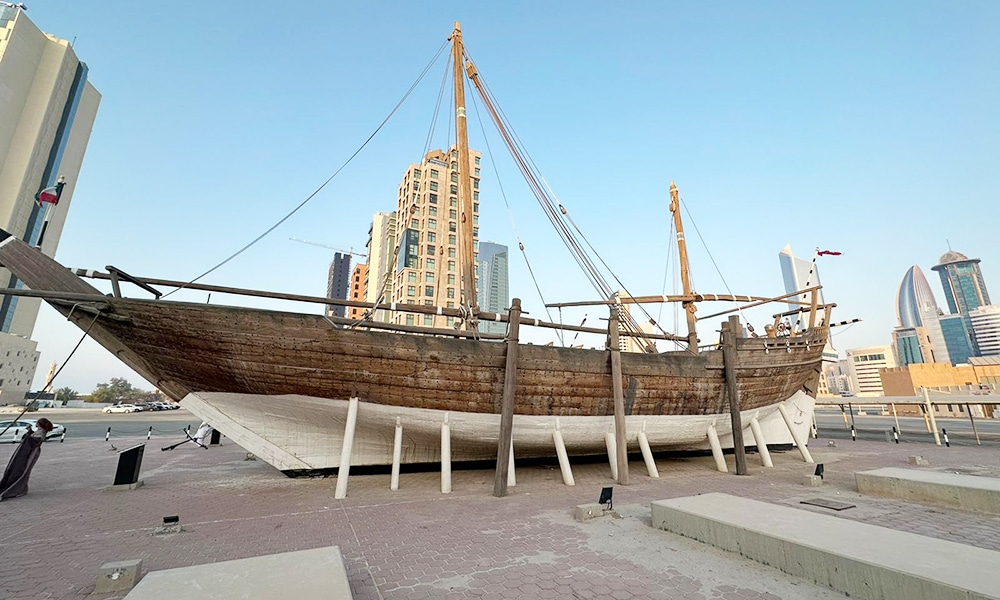By Khaled Al-Abdulhadi
KUWAIT: Ali Hassan Al-Jasmi, the son of one of Kuwait's revered captains, embodies the maritime spirit deeply embedded in Kuwait's heritage. He takes us back to an era before technology's prominence, when society's identity was closely intertwined with the dedication and hard work of its people in service of their homeland. Al-Jasmi paints a vivid portrait of his father, Hassan Al-Jasmi, who embarked on his maritime journey at the tender age of 10, commencing as a "tabbab", a role usually reserved for older individuals. Over time, he ascended to the esteemed position of chief helmsman, known as a "sukooni", aboard trading vessels that ventured as far as India and Zanzibar. Hassan Al-Jasmi's life was an unwavering commitment to the sea, from start to finish.
Reflecting on his own childhood in the 1950s, Ali Al-Jasmi fondly recalls accompanying his father to the "Tishala", a vessel meticulously crafted by skilled al-qallalif craftsmen in Kuwait. This architectural marvel was primarily responsible for transporting incoming trade from ships at the Hamal Bashi cargo station to Kuwait's bustling main port. "My father, Hassan Al-Jasmi, was the 'noukhada' (captain) of the ship, which belonged to Hamal Bashi," he proudly recounts.
 Young Ali also accompanied his uncle, who held the esteemed title of noukhitha, of a "leng", a vessel smaller than the Tishala. Later, he witnessed the operations of a "tek", a steel ship designed for the purpose of lifting other ships to the primary storage station. In this intricate maritime hierarchy, the noukhitha, led the "mjadimi", who oversaw the ship's workers and conveyed instructions from the noukhitha to the labor force. These directives ranged from optimizing cargo organization to ensuring the ship's equilibrium. "The ship's laborers were known as 'mzouri', with many hailing from Basra or the Gulf," Al-Jasmi explained. He further elaborated on the presence of a gatekeeper, or "ja'eedah", tasked with safeguarding the goods while the ship remained anchored in the harbor.
Young Ali also accompanied his uncle, who held the esteemed title of noukhitha, of a "leng", a vessel smaller than the Tishala. Later, he witnessed the operations of a "tek", a steel ship designed for the purpose of lifting other ships to the primary storage station. In this intricate maritime hierarchy, the noukhitha, led the "mjadimi", who oversaw the ship's workers and conveyed instructions from the noukhitha to the labor force. These directives ranged from optimizing cargo organization to ensuring the ship's equilibrium. "The ship's laborers were known as 'mzouri', with many hailing from Basra or the Gulf," Al-Jasmi explained. He further elaborated on the presence of a gatekeeper, or "ja'eedah", tasked with safeguarding the goods while the ship remained anchored in the harbor.
"When the ships arrived at Hamal Bashi, the Tishala diligently transported the goods, which belonged to Kuwaiti businessmen, to temporary storage facilities before their rightful owners claimed them," Al-Jasmi added. He warmly recalled visiting the "falka", a ship's section where an assorted array of goods, freshly unloaded from the crane, found their temporary abode. "I would often hear the cry of 'Bo Ali, Bo Ali' from workers seeking the captain's assistance," he said, evoking nostalgic memories. In recollecting his father's unwavering commitment, Al-Jasmi notes: "If my father ever came across poorly packaged products, he wouldn't return home to rest. Instead, he would sleep close to the cargo, ensuring it reached the businessmen in impeccable condition."
Following his tenure as the noukahda of the ship, Hassan Al-Jasmi returned it to Hamal Bashi. Subsequently, the vessel changed hands, finding new owners in a Gulf nation, and ultimately becoming part of the Kuwait Foundation for the Advancement of Sciences (KFAS) maritime museum in Sharq. Ali Hassan Al-Jasmi's narrative serves as a poignant reminder of Kuwait's rich maritime history and the enduring dedication of individuals like his father, who made profound contributions to the nation's development.








